50 Ways to Change a Refugee Girl's Life With Tech
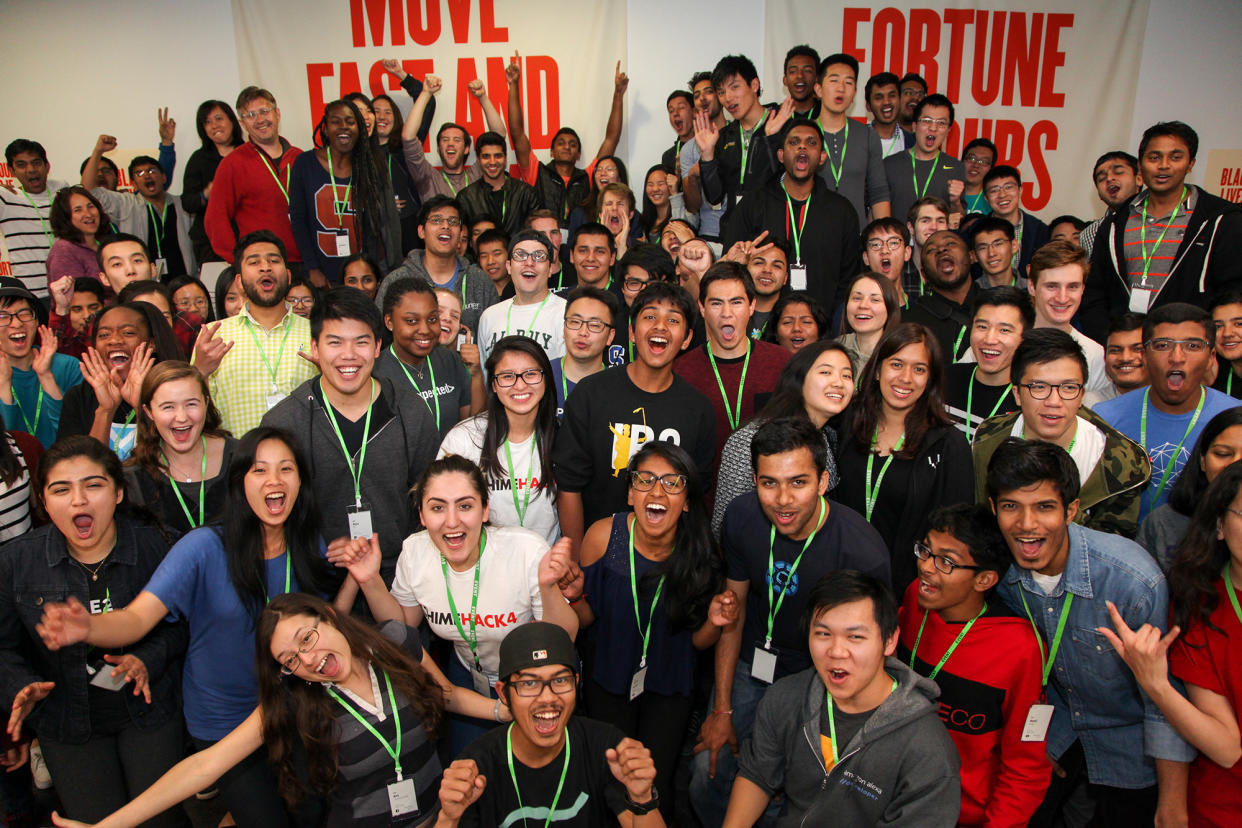
“I see a few pillows in the audience; don’t fall asleep on me,” Gucci’s executive vice president and CMO Robert Triefus joked in his opening remarks at CHIMEHACK4, a two-day hackathon hosted by CHIME FOR CHANGE, together with Gucci, Facebook, Global Citizen, and venture capital firm Kleiner Perkins. He needn’t have worried; there were certainly no plans for napping among the nearly 250 hackers, programmers, coders, and assorted tech wizards present at the event. Quite the opposite, in fact; most were planning for all-nighters (even if they had brought a sleeping bag or pajamas with them).
CHIMEHACK, now in its fourth year, took place at Facebook’s HQ (street address 1 Hacker Way, go figure) in Silicon Valley. The task at hand: Design an app, a product, a solution, a tech-forward something to afford refugee children and young women greater access to schooling and education - anything from reading and writing tutorials to period hacks, from cross-cultural assimilation tips and job training to social media networking. Twenty-four hours of hard work later, and there were chatbots (lots of chatbots), messenger bots, and classroom apps, SMS games and sponsorship networks, open source Q&A forums and mentorship platforms, AI teaching assistants and MP3 lesson plans.
CHIMEHACK4 Challenge: Design a technological solution that will reach school-age refugee girls with quality education while they are unable to access formal schooling.
“If we want to see a world where girls and women are equal, and have equal access to health care, education, and treatment under the law, we have to stay focused,” Susan Chokachi, president and CEO of Gucci America, explained, "[and] the whole premise of CHIMEHACK [and CHIME FOR CHANGE] is to use the creativity of a brand like Gucci, and the relationships that we have, to bring new and creative solutions to bear." “It’s the right thing to do, and certainly I say that as an individual [but also as someone] representing Gucci, because I'm fully empowered to say that," she continued. "Our leadership allows us to operate in this space where we can stay true and convicted to these ideals that we have. All of our stakeholders are invested in this. All of our employees. And our clients too. Gender equality is an urgent priority for everyone now.”
"Seventy-five million children around the world have had their schooling disrupted due to conflict, natural disasters."
A panel discussion served as the hackathon’s informational "pregame" session, framing the sociocultural issues behind the challenge. This offered much compelling insight for the hackers regarding the state (and the scale) of the global refugee crisis - and drove home the importance of innovative activism in the field.
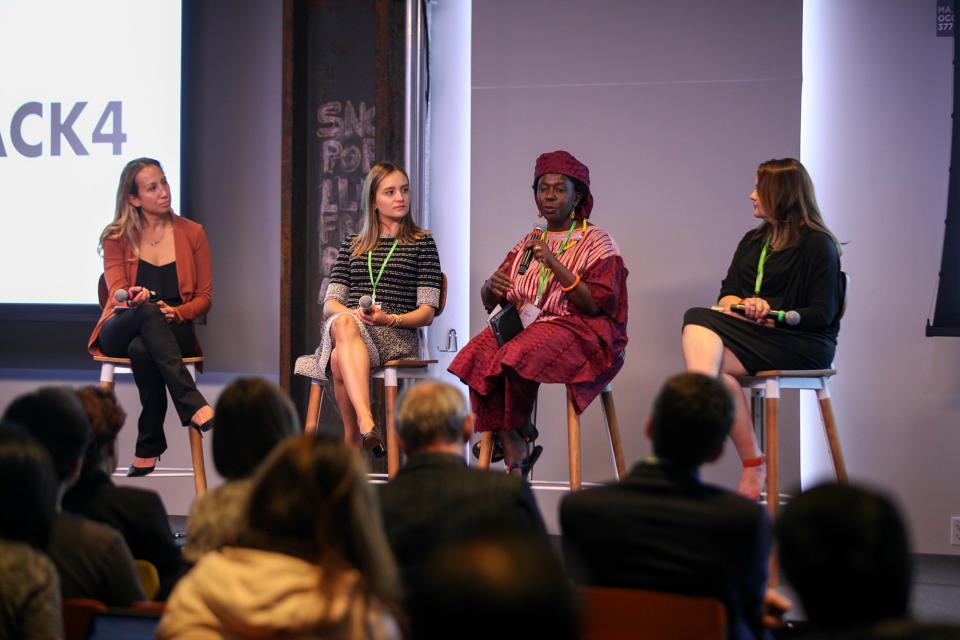
“If there’s one number to take away, that’s 75 - the 75 million children around the world who have had their schooling disrupted due to conflict, natural disasters, and crises,” noted Leticia Pfeffer, senior coordinator for global policy and advocacy at Global Citizen. “And of course [these disruptions] disproportionately affects our world’s girls.” Girls and young women “are 90 percent more likely to be out of school in conflict zones than elsewhere and this has a monumental effect on their lives,” she continued, explaining that “more-educated girls and women are more likely to marry later, have more agency over their sexual and reproductive health, and ultimately lead healthier and more economically productive lives.”
“For one minute, put on a pair of glasses and call them your ‘gender glasses,’” Patty Alleman, senior gender and development adviser at UNICEF, asked the audience. “Our mandate [at UNICEF] is to reach the potential of every child, and that makes us say not just ‘Where is the biggest need?’ but ‘Where is the biggest opportunity?’ When we put on those ‘gender glasses,’ what we really see is that 10- to 19-year-old girls, adolescent girls, are really the [children] with the biggest needs and the biggest potential." (In a particularly timely partnership with Gucci, UNICEF recently launched the Girls Empowerment Initiative to focus on developing tech solutions to help further gender equality.)
Notably, the panel also challenged many a participant’s preconceptions of what it means to be a refugee today - in other words, hackers who’d come with preplanned apps and products in mind were forced to rethink. While a refugee is “someone just like you or me, and their aspirations are no different from [ours],” Dr. Musimbi Kanyoro, president and CEO of the Global Fund for Women explained, she offered a reminder that they are unique in their circumstances and the challenges they may face - from a girl struggling in school in her host country due to a language barrier to a girl struggling in her refugee camp because there’s no schooling, or even electricity, period. (Connectivity and access to tech were particular challenges for the hackers to overcome.) “A girl is not a girl is not a girl, right?” Alleman added, asking the hackers to consider the diversity of refugees across the world today and target their efforts for a specific individual. “Who is your user? And why is she a refugee?” she asked. “What is her age? Where is she from and where is she [now] located? What cultural ecosystem is she living in? What language, or languages, does she speak? Is she alone? Does she have a disability? Is she sexually active?” Once you put a human face on this girl, your user, that’s where there will be some amazing solutions.”
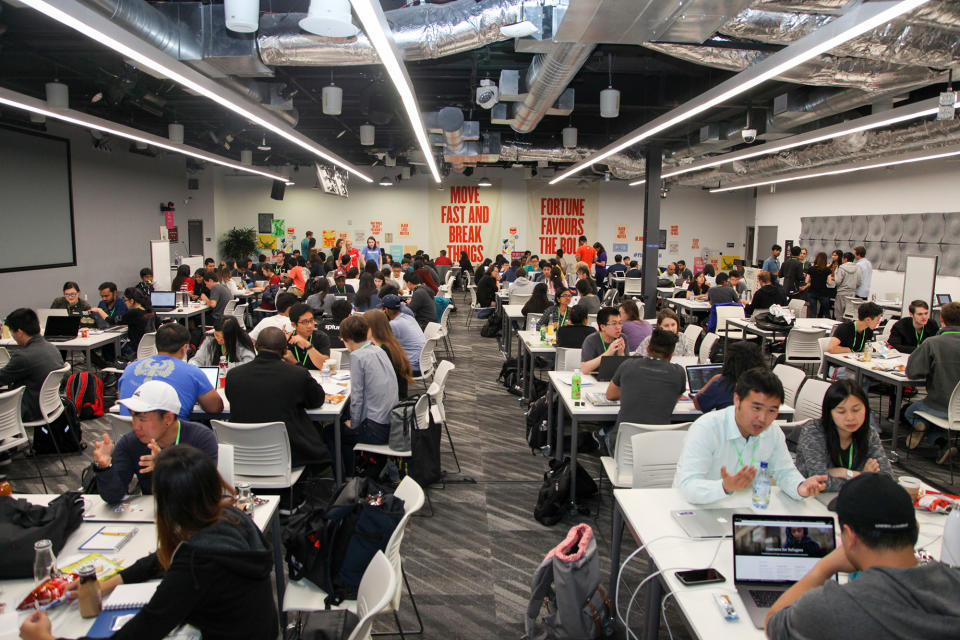
So with the clock ticking, the hackers present swarmed into the holding rooms - two upscale industrial office spaces with walls adorned in motivational poster collages: “MOVE FAST & BREAK THINGS” and “WHAT WOULD YOU DO IF YOU WEREN’T AFRAID?” (Oh, but do be afraid of the foxes, a Facebook security guard cautioned the hackers - Facebook’s campus has foxes, fun fact, and they are to be treated as wild animals, not fed treats or used as props for the Insta.) Many of the hackers had come with friends as preformed collectives, others grouped up then and there - like team Mama, the sole all-girl group present, comprising Esmerelda, Karla, Kate, Rocio, and Shubha, young students and Silicon Valley summer interns. (As a whole, the hackathon’s gender balance skewed 60–40 male to female, with most groups mixed gender.) Team Mama's plan: a chatbot app and SMS platform designed to help their user, a pregnant Syrian teen girl living in a refugee camp, access sexual health information and medical professionals.
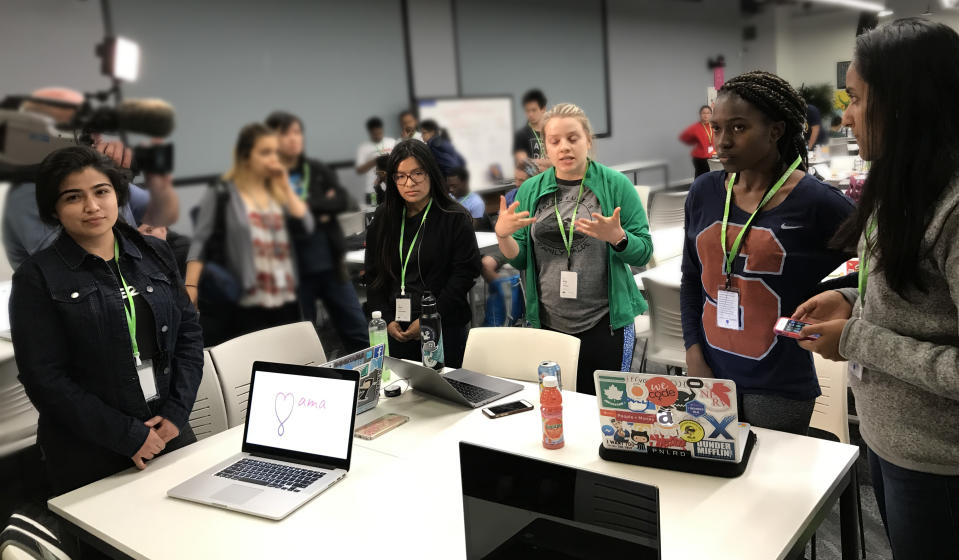
“We can put ourselves in [our user’s] shoes,” Shubha, 19, noted. “We are from a first-world nation so we can’t completely relate with a refugee woman,” Esmerelda, 22, added, “but there is that sense of connection between us as young women.” “And certainly for us, working on a health care app,” Kate, 21, said, “we have more of an understanding of the needs of women whereas a group of men night not understand that.” (“There were a few sort of heavy-blinking moments when talking with the male [group leaders] about periods and menstrual pads,” Patty Alleman added later, “but not, like, total disregard. They really wanted to understand.”)
And after a brief, frantic run on the snacks provided, all the brainstorming and hard work and, you know, hacking actually began.
Let’s take a minute to reclaim the word “hacking” as ~a force for good~ in this context, because it’s not always about espionage, phishing attacks, and stolen nudes. (Or, you know, that classic Sandra Bullock movie The Net if you’re old-school.) “Hackathons [like CHIMEHACK] at Facebook are a tradition that's many, many years old,” Naomi Gleit, Facebook’s VP of social good, explained, “where we'd just stay up all night and into the morning working on whatever wasn't part of our normal day job - if we had a project we were particularly passionate about or had found something really cool we wanted to work on, but couldn’t do it [during our] 9-to-5.”
"From day one, I always thought technology — and Facebook — was a force for good, and that's why I'm so committed to making it available and making it even more powerful."
A 12-year Facebook veteran, Gleit has been running the site’s social good efforts for three years. “From day one, I always thought technology - and Facebook - was a force for good,” she says, “and that's why I'm so committed to making it available and making it even more powerful.” It’s about “democratizing knowledge,” she added, and “giving people [the ability] to share and make the world more connected.” The social good team’s goals are to better identify and highlight all the activism and #FeelGood karma moments happening on Facebook already, then to build tools to both harness and further those efforts (and make the goodwill easier). So far, these tools include charitable giving and donation features, both on a global or personal scale, like this fundraiser for Syrian refugees for example - any 501(c)(3)-registered charity can be the recipient. Other tools are the site’s well-known “Safety Check” and related community help features, which work to connect those caught in a natural disaster or incident with those offering assistance. Incidentally, the Safety Check tool was borne out of a hackathon - as was, wait for it, Facebook Video.
“I’ve been one of these hackers several times," Gleit reminisced, “[though] I'm too old for it now.” In the 24-hour timeframe, the game plan is usually “to create a prototype. You're not building a full-fledged product - you basically demo the concept and show it to the judges. I know Mark [Zuckerberg] loves participating. That's where he sees some of our most innovative ideas. And he'll say, you know, 'What an amazing product; I want to invest.' Just like that!”
Though Zuckerberg was not among the CHIMEHACK4 judges, the panel featured many Silicon Valley experts, venture capitalists, executives from Gucci, UNICEF, and Global Citizen, and ambassador Ayşe Sinirlioğlu from the Turkish Ministry of Foreign Affairs. They convened Sunday morning to pick seven winners from the 50 products presented, with each group allowed only a two-minute presentation (and an extra minute to field questions, even in their sleep-deprived state). It’s “like a high-stakes science fair,” one judge, Sue Young, Facebook's product lead, events product, noted.
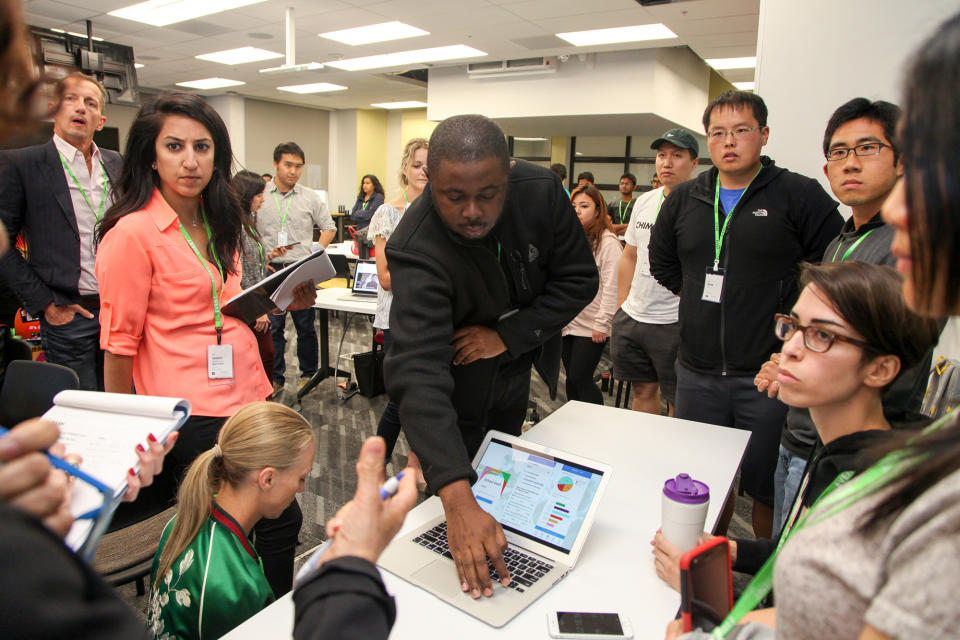
Just a few of the standouts included Literight, an app to help with reading and writing via penmanship and writing demos, as well as PICTHERESQUE, an augmented reality app which allows its users to take a photo, any photo, and receive an audio translation, in a language of their choice, of that photo’s subject as a word and in a sentence. There was #teacHER, a classroom-based group chat and learning materials directory; Allied, an education network app connecting a refugee camp’s community across students, parents, teachers (and their off-site sponsors); and Shyft, a database connecting refugee girls with online work opportunities and training. There was also Madeleine, the sex ed monkey app in Messenger, which even came with cute lil monkey emojis. I could go on.
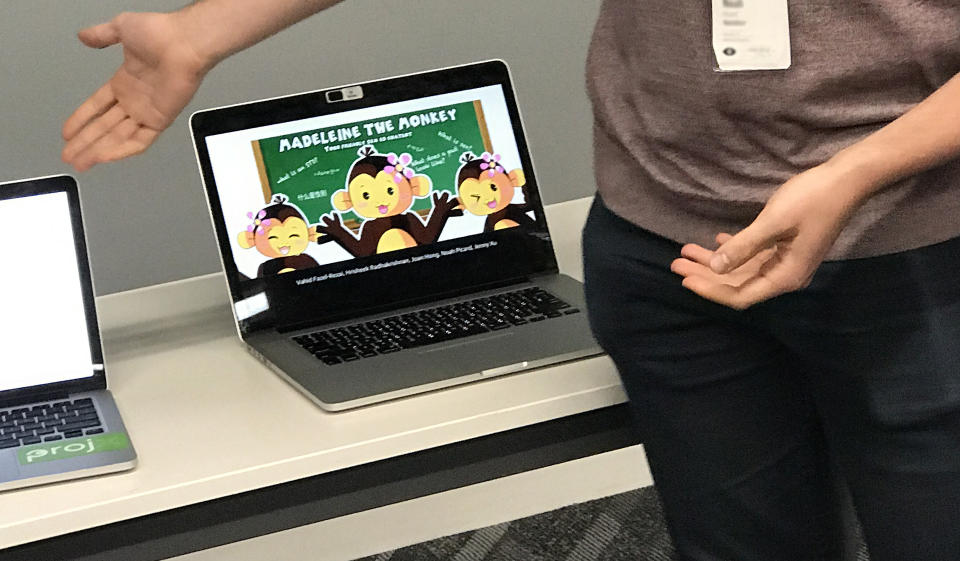
After a spirited discussion backstage, the judges narrowed their (long) shortlist of faves down to their lucky seven. The prize winners in full:
• PICTHERESQUE, an augmented reality app that addresses the language barrier for refugee girls on the move, won the prize for Unique Concept and Originality, sponsored by Gucci, which included a $5,000 cash prize and tickets to the 2017 Global Citizen Festival.
• Madeleine, a chatbot that anonymously provides reproductive health education and support for middle school-aged refugee girls, won the prize for Social Good, sponsored by Facebook, for the best use of Facebook’s platforms for impact. The prize included VR headsets.
• Mama, an app that connects skilled health care professionals with young refugee mothers in their native language, won the prize for Global Citizenship, sponsored by Kleiner Perkins, which included a $5,000 cash prize and an interview for each team member to become a Kleiner Perkins Fellow.
• Grow Together, a web app that connects refugee girls with mentors, won the prize for Best Product, sponsored by Hearst Magazines, which included a $5,000 cash prize and incubation at the Hearst San Francisco office.
• Sheacher, an app and SMS service to make education and emergency resources easily accessible to young refugee girls, won the prize for Young Innovators, sponsored by Chegg, which included a $5,000 cash prize.
• DASH, an app that aggregates information about local schools and education providers to help refugee girls on the move, won the prize for Connection and Integration, sponsored by Enjoy, which included a $5,000 cash prize and a meeting with Enjoy’s CEO and Creative Director.
• EmpowerPods, a solution that creates and connects a community of refugee girls to help continue their education, won the prize for Transforming Lives Through Learning, sponsored by Coursera, which included a $5,000 cash prize and meetings with Coursera leadership.

Celebrations aside, everyone’s immediate priority after the hackathon’s conclusion was likely to be catching up on sleep and enjoying a warm shower - the hackers' quarters had begun to smell like a college library during finals week, to be quite honest. (I'm saying this only to highlight sweaty dedication apparent; people slept on the floor!). But CHIMEHACK5 is already in people’s minds. “I mean how can you have something like this and not build on it every single year?” Susan Chokachi noted, adding that “five is a momentous occasion” and there are “ambitions” to take the hack global next year. “In the virtual world, why not have participants from all over the place?” Chokachi suggested - and just FYI, this reporter has already volunteered to cover the Fiji hackathon next year should such a tropical location make the cut. Thanks in advance!
Follow Alex on Twitter.
You Might Also Like

 Yahoo News
Yahoo News 
